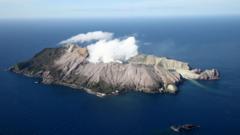The court's ruling came after an appeal highlighted the limited role of WML in the day-to-day management and risk assessments on the active volcanic site. Justice Simon Moore acknowledged the deep human tragedy linked to the incident but emphasized that legal accountability rested outside the ownership of the land. While the legal proceedings against WML have now concluded, Worksafe NZ, New Zealand’s safety regulator, is weighing its options regarding a potential appeal, expanding the ongoing dialogue surrounding safety regulations on natural attractions.
This reversal brings to a close a significant chapter in New Zealand's legal and tourism discourse, raising questions about landowner liabilities and safety responsibilities in adventure tourism. The Buttle family, who have owned the volcanic island since the 1930s, expressed their relief, pointing to the ruling as a precedent that clarifies the roles of landowners in recreational contexts.
This reversal brings to a close a significant chapter in New Zealand's legal and tourism discourse, raising questions about landowner liabilities and safety responsibilities in adventure tourism. The Buttle family, who have owned the volcanic island since the 1930s, expressed their relief, pointing to the ruling as a precedent that clarifies the roles of landowners in recreational contexts.



















